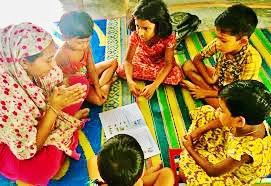A program dedicated to teaching illiterate mothers how to read, and in turn to teach their children in the slums of Bangladesh, was detailed to the Weyburn Rotary Club in a Zoom presentation on Thursday.
The Amarok Society program is supported by around 200 Rotary Clubs from around North America, and was begun by a Canadian woman, Tanyss Munro, and her husband Gem in the capital city of Dhaka in January of 2006.
Munro described the chaotic scene they found when they landed in Dhaka in 2005, a city of some 25 million people and the capital of Bangladesh, which grows by an estimated 800,000 people per year. This country is one-sixth the size of Saskatchewan, but has a population of over 175 million people currently.
“It really is unbelievable. We thought we had landed in the midst of a revolution,” said Munro of the noisy, crowded city.
The education system they found is so bad that UNESCO declared this country has an education crisis where one in every three children will grow up not knowing how to read or write. Munro pointed out the state-run schools have the shortest school days in the world, at about two hours a day, with classes of 50 to 60 children who are taught by rote learning.
In addition, the underpaid teachers will tutor these children outside of school hours for a fee, in groups of some 20 to 30 children, explained Munro, a situation known as “shadow education”.
What Munro and her husband came up with was a system to teach mothers in the slums, and they in turn pay their education forward by teaching at least five children each in their neighbourhoods. As these mothers have to work each day also, the classes go for about two hours a day, and many of these children will in turn teach their siblings, cousins, friends, parents and even grandparents about what they’ve learned.
“We have stories of some very serious seven and eight-year-olds teaching their grandparents, going, ‘no grandpa, you’re not holding the pencil right’,” she said with a chuckle.
Today, the Amarok program has some 575 mothers who are teaching around 3,000 children in the slums. As an example of how successful the program has been, Munro noted that one of their students is currently on scholarship, attending Dalhousie University here in Canada.
This success was tempered by the observation that in a country with millions of children who can’t read or write, this is just a drop in the bucket of the needs in that country, said Munro.
Asked how the organization is funded, she noted about a quarter to a third of their funds come from some 200 Rotary Clubs across North America, and a number of individuals and companies who have stepped up as sponsors as well.
The cost is about $65 for one student for a year in one of these micro-schools, with students learning for some four or five years before moving on to a state-run public school.
James Kroeker, a member of the Dryden, Ont., Rotary Club, has been involved with this program, and commented, “I was in awe of what the Munros were able to do, the whole idea of empowering women to unleash education in their neighbourhoods.
Their club raised about $20,000 last year, and have been able to keep about 23 schools running with their support. They partnered with a university-based Rotaract club in Winnipeg, and a member of that group, Grace Gao, also made a presentation about what they’ve been able to do to support the Amarok program.




